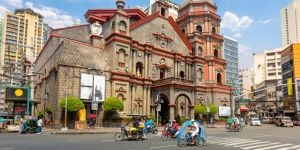Registering a birth in the Philippines
Subscribe to the topic
Post new topic
Hello everyone,
Have you had to or are you going to register a birth in the Philippines? What was the experience like?
Who is required to register the birth, and where? Can it be either the mother or father?
What documents are usually required in the Philippines?
How long does the process to register a birth take? Are there any time limits in which the registration must be completed?
Did you register the birth with your home country and how did that process compare? Will your child be able to have dual nationality?
Thank you for sharing your experience.
Priscilla
Registering Birth is easy. It should be registered 1 week within birth.
Hospital will give a form post birth where you need to enter details like mom and dad's name passport number etc.
Once filled, either can be submitted back to hospital if hospital is doing process for you or you can got to city hall of your area.
Submit form there and collect the birth certificate after 1 week.
There are 2 types of certificate, one is normal one and another is attested by NSO. NSO attested certificate is required and this certificate is only valid for passport or any govt work required in future for kid.
You can apply for as many copy as you want since govt offices in Philippines keep the original one.
Hi Priscilla
My Canadian friend, who is married to a Filipina, registered the birth of their daughter in the Philippines over a year ago. There is ample information on the internet regarding this process, so no need to explain all this paperwork except do double check each form carefully for correct spelling and correct dates! Any error can cause you a lot of grief to have corrected later on.
The child is a Filipino citizen by birth. Over the next year, my friends went through a long process to register the child for Canadian citizenship through the Canadian Embassy. Although not necessary, my friends used an agency to deal with this lengthy procedure . About a year later, she now has her Canadian citizenship. Their daughter is now almost 2 years old and will also have her Canadian passport in about a month. This is a separate application.
You can get Philipino citizenship by birth but it is not mandatory.
You can get any citizenship either attached to mom's Passport or dad's Passport.
While you may attach the child to your passport if the child has her foreign citizenship of the parent, it is not recommended. The child should obtain his/her own passport. Reason? If both persons are travelling abroad with the child and one parent needs to travel separately (due to an emergency), and that parent has the child's attached passport, you cannot leave the child behind with the other parent. If you do, you need to undertake a return trip to bring the child back into the country!
Although I have not fathered a child here in the Philippines, I have helped a few others with some real issues that are seldom addressed.
My post is limited in both scope and depth and should be researched further than this brief overview. An expat parent may want to review the following terms and meanings with his Filipino spouse to reduce common misunderstandings:
- First/given, middle,
- Last/family/surname,
- First names that are part of a two-word given name,
- A maiden name,
- A baptismal name (e.g. a name invoking a believed saint),
- A maternal surname*
* U.S.A vs. Philippines where a mother's before marriage and after marriage maiden name officially changes.
Fact 1: Many Americans follow tradition and make a "Middle" name for their baby that is basically a second "first or given" name.
Fact 2: The above fact will not be easy to accept from the Filipino hospital staff that will want to force the Filipino naming structure on the expat.
Example:
SIngle Filipino lady has the following naming structure:
First Name Middle Name
(Often double-worded) (Lady's Mother's Surname) Family Name
Mary-Joy Reyes Santos
Married Filipino lady has the following naming structure (married to expat named John David Smith):
First Name Middle Name
(Often double-worded) (Lady's Maiden name) Family Name
Mary-Joy Santos Smith
John and Mary-Joy have a new baby boy and John wants his dad's first name of "Adam" as the baby boy's "Middle" name.
John & Mary-Joy decide to honor John's dad and name the new baby:
First Name Middle Name
(Not double-worded) (Lady's Maiden name) Family Name
Steven Adam Smith
The Problem: Often and unless caught, the hospitals in the Philippines will do the following changes, regardless of what John or Mary-Joy placed on the forms:
New baby will be officially named using this format:
First Name Middle Name
(Often double-worded) (Mother's family name) Family Name
Steven -Adam Santos Smith
Most of the above filipino positions are based on “Jus Sanguis” vs “Jus Soli” in the USA. So this difference creates part of the structures that are listed above:
"What consist the full name of an individual?
The full name of an individual consists of a first or given name, a middle name which is the mother's maiden surname and the last name which is generally the father's surname. Entries of names in the birth certificate should, as much as possible and legally permissible, follow the above convention. (I.M. p 14)"
Source: https://psa.gov.ph/civilregistration/legitimation
After all of this, some expats find that the US Authorities will re-name visa applications (i.e., a maiden name is always a maiden name and never the mothers dad's family/last name) to the US format for processing.
Another area for the expat to watch closely are the name(s) used and placed on the child's school records. Filipino schools will add what they feel are the proper "Filipino mother's names", even if the child's birth record did not reflect the added name. This can be a "red-flag" for the expat child's transcripts that may be processed for acceptance in the USA later.
This may seem trivial but an expat is wise to check with his/her country on passport naming structures that are not Spanish based. Also if the couple plan to have easy entry into the USA, Birth Certificates with errors will delay/prevent such wishes.
The expats in Japan have an even more complex task than in the PI: https://www.japantimes.co.jp/community/ … baPFku3MgM
Calif-Native post is right on track. I would add that many hospitals and local government unit(s) (LGU) are ignorant of the laws also. I had to go through a hectic process with one such hospital and the LGU, even involving the director of the Civil Registry Division (CRD) in Manila.
There is a lawful exclusion of a middle name on the birth certificate, which means that the mother's maiden name does not have to be listed. However, the head of the LGU insisted on doing it his way, instead of what the Instruction Manual of Forms CIvil Registry (Accomplishment and Coding) on page 15 that the NSO uses. I grew weary of banter with a person that is clearly ignorant of statutes and deems it necessary that he is correct in his assumption, than reading the policy.
He said, "There are many ways to interpret English.", when reading the email sent to me by the director, which states that "the middle name may or may not have an entry".
REALLY!!!
I told his clerks to do it his way and reported it to the American embassy and all the schools that my daughter (2nd child) has attended to please omit the mother's maiden name, as it is not part of her given name to the NSO or the United States. All schools have complied and her U.S. passport list her names given by me correctly.
I have no problems with the birth records of my other children, as my 1st child was born in another LGU. It was in the hospital where I first found out about the "middle name" policy. So I made sure my 3rd child was birthed in the same municipality.
All in all things are good for now. As foreigners we have to deal with ignorant persons and/or autocrats.
Alltojah has touched on this with even greater "real-life" details. Expats need to be fully aware of most of the 211 pages in RA 9048 to both understand the law and to protect their child from future issues which could be very difficult if not impossible to affect a positive change.
Examples include:
Wrong Nationality - If the reported birth list the wrong nationality, Section 2(3) of RA 9048 states that no change in nationality is allowed without a court order.
Must return to province of birth to correct errors - Section 3 of RA 9048 states:
"In case the petitioner has already migrated to another place in the country and it would not be practical for such party, in terms of transportation expenses, time and effort to appear in person before the local civil registrar keeping the documents to be corrected or changed, the petition may be filed, in person, with the local civil registrar of the place where the interested party is presently residing or domiciled. The two (2) local civil registrars concerned will then communicate to facilitate the processing of the petition."
Most local civil registrars will send the person away telling them they must return to their birth province to make corrections. Know the above provision, note/understand the legal meaning of the words "may" and "will" and save a wasted trip.
- May = Optional ("the petition may be filed" means at the petitioner's discresion)
- Will = Must do (The two (2) local civil registrars concerned will then communicate to facilitate… means they must do this for the petitioner)
Note: When a director or leader of a government office tells the expat, "There are many ways to interpret English.", the expat should be comfortable in telling these individuals that the legal language of the Philippines is ENGLISH and subject to interpretations as adjudicated in the US Courts. Here is an example of a Philippine Administrative Order (No. 133) that specifically uses "Blacks Law Dictionary (5th Ed.) along with US Case law (City of Battimore v. Cornellville & S.P.P. Ry. Co., G.. 190), to define/interpret English words used in legal proceedings here in the Philippines.
Source: http://www.chanrobles.com/administrativ … bdN9Eu3MgM
Lost ability to travel/work abroad
- Page 36 of RA 9048 lists a case that shows how this person "Maricel Limon dela Guardia" lost an opportunity to work abroad from first name that was not the same as on her NSO certificate.
- Page 37 of RA 9048 lists a case that shows how this person "Anthony Celies Moriones" was refused a passport.
Here is a link that may be of help to US Expats that have received a letter from the US Embassy regarding needing more info on their child's passport application with the most common reasons they have contacted you:
https://travel.state.gov/content/passpo … email.html
Expats need to make sure that any errors on their baby's birth certificate is the result of misspelling in order to correct it under RA 9048. Otherwise the system here will call it a name change and the expat will need to follow the name change steps outlined in Rule 108 of the Rules of Court in order to apply the necessary “correction” through a court proceeding.
For U.S. Citizens the checklist on this link (https://ph.usembassy.gov/wp-content/upl … anuary.pdf) is essential.
We just went through this process a few months ago. To my knowledge the CRBA is voluntary. However, if one wants their child(ren) to have status in the U.S. (Social security card; social security benefits; U.S. passport; etc) then the CRBA is critical. If this is not done while the U.S. Citizen parent is living a child who wants to have U.S. citizenship status after the parent's death is left to manage a complicated set of requirements, including proving the parental relationship, on their own.
Completing the process requires a birth certificate. The certificate given at the hospital is not sufficient. Which means getting a certified true certificate of live birth from the Philippine National Statistics Office. Which means managing a process "hands on" that can take months. The certified original document is a requirement.
The process requires a trip to the U.S. Embassy in Manila for the child(ren) for an interview, no matter their ages. Our double seat baby stroller, carrying our twins, was quite the sight. They were almost four months at the time. As you can imagine they did very little talking. Nothing coherent. The interview is with a career foreign service officer. All of the other processing was with staffers. This is important to know because it is the officer who will determine if parental proof is needed.
Finally, I would advise that any U.S. Citizen who has a child by a Filipino takes care of the CRBA as soon as possible. If the citizen is a retiree the CRBA is essential for the child to receive social security benefits. These benefits can contrubute to a child having a more financially secure life (think college fund).
Any questions?
A little more knowledge to add to the pot of ElGatoNegron. If anyone lives in the Subic, Angeles, or Cebu region and abhors making the trip to Manila, they can await the local visit of the American Citizen Services.
I certified all three of my children for CRBA during the outreach program along with the passport. I cannot remember; if the social security card was part of the process, but I know it did not take long. You may need to have a paternity test done, which would be at St. Luke's in Manila, but I was blessed to not have to complete that task.
Our children are registered by hospital and NSO birth records, CRBA, social security, Philippine and U.S. Passports by their first names (two), middle name (mither's family name) and our/my family name. Maybe you trained them 😊. This was never a problem. We'll see what happens when they got school in four and a half years.
bob18 wrote:While you may attach the child to your passport if the child has her foreign citizenship of the parent, it is not recommended. The child should obtain his/her own passport. Reason? If both persons are travelling abroad with the child and one parent needs to travel separately (due to an emergency), and that parent has the child's attached passport, you cannot leave the child behind with the other parent. If you do, you need to undertake a return trip to bring the child back into the country!
Agree, whole heartedly. Additionally, a child with two passports (Philippine and U.S. for ours) has a distinct advantage (even over their Philippine parent, perhaps). They are able to use their nonPhilippine passports to enter countries more available to them than if they only had a Philippine passport only.
This topic has many different customs, traditions and laws that conflict both in country and across borders. I am illustrating how Philippine customs based on modified Spanish naming traditions is thought to be included in the laws here. There are laws that will directly affect expats if they are not married to the child's mother that can cause some locals to change the expat's chosen name(s).
The problem, as I see it, is that despite hospitals and other LGU's insisting on their views for making a middle name legal, they are unaware of or just don't care that the Philippine government made a categorical pronouncement in the DOJ Opinion No. 34, Series of 2011 that middle names are purely customary ( i.e., not obligatory).
Yet, more confusion is added under Article 174 of the Family Code where is states that under Philippine Law, where a person has no middle name, he has the status of an unrecognized illegitimate child (if the father did not expressly acknowledged the child). Republic Act (R.A.) No. 9255 needs to be understood in that case by the expat.
Fast forward to expats from USA where a SSN is required for the baby. The SSA has placed an interesting legal definition in their POMS (RM 10212.001) back in 2014 which states:
"For SSA enumeration purposes, a legal name consists of a:
- first name; and
- last name (or surname)."
…. and continues with;
"We do not consider the middle name or suffix part of the legal name. Whether the middle name or suffix is included, omitted or incorrectly shown on evidentiary documents submitted with an SS-5 (Application for a Social Security number Card) does not matter."
All US focused expats with spouse/child "returning to USA plans" should pay close attention to how one small change/mistake here in the PI can cause so many problems with just the US SSA alone. A close review here may be in order for some:
GN 00302.460 ( https://secure.ssa.gov/poms.nsf/lnx/0200302460), Discrepancy in Claimant’s Name-Minor Differences
RM 10210.210 ( https://secure.ssa.gov/poms.nsf/lnx/0110210210 ), Reviewing Age, Identity, Citizenship and Lawful Alien Status for an SSN Card
RM 10210.200 ( https://secure.ssa.gov/poms.nsf/lnx/0110210200 ), General Information on Reviewing and Verifying Evidence for an SSN Card
RM 10205.130 ( https://secure.ssa.gov/poms.nsf/lnx/0110205130 ), Entering Other Names of NH in SSNAP
RM 10212.010 ( https://secure.ssa.gov/poms.nsf/lnx/0110212010 ), Evidence of a Legal Name Change on the SSN card
RM 10212.150 ( https://secure.ssa.gov/poms.nsf/lnx/0110212150 ), Name Correction on the SSN
It is not possible to give this topic all that may be due in this forum. Each person needs to just think about their current and future plans as they adjust their individual info filtering of these topics.
Thank you for this information, as I may need it in the near future  . Can you confirm for me the length of time it takes NSO to register a birth? I was under the impression that it took much longer.
. Can you confirm for me the length of time it takes NSO to register a birth? I was under the impression that it took much longer.
The NSO birth certificate usually takes about a month, but that would also depend on the LGU (local govt. unit). Make sure the birth certificate that the LGU gives you is in order. Do not allow them to give you a birth certificate with any errors, typos, and/or type that lies outside the border areas, such as the last digit of my daughter's birth year was in another text box on the LGU birth certificate. This caused the NSO copy to be missing that digit because they basically make a copy of the LGU with official info and govt. paper.
The NSO copy is the official document used for everything, but if the LGU messes that up then you have to go through a lengthy, legal process to fix the discrepancy (can you say "more money!"). I was told 4-6 weeks I could request a copy of the birth certificate, but all of mine were ready for online order within a few weeks and they are delivered to the Philippine address via courier service.
Thank you, that is really appreciated
alltojah wrote:The NSO birth certificate usually takes about a month, but that would also depend on the LGU (local govt. unit). Make sure the birth certificate that the LGU gives you is in order. Do not allow them to give you a birth certificate with any errors, typos, and/or type that lies outside the border areas, such as the last digit of my daughter's birth year was in another text box on the LGU birth certificate. This caused the NSO copy to be missing that digit because they basically make a copy of the LGU with official info and govt. paper.
The NSO copy is the official document used for everything, but if the LGU messes that up then you have to go through a lengthy, legal process to fix the discrepancy (can you say "more money!"). I was told 4-6 weeks I could request a copy of the birth certificate, but all of mine were ready for online order within a few weeks and they are delivered to the Philippine address via courier service.
I very much agree with making sure all elements of a Philippine birth certificate is correct; from the hospital to NSO. Getting a birth certificate changed can be a lengthy nightmarish and frustrating process. It is estimated that 30 million Filipinos either have no birth certificate or incorrect birth certificates. My wife was one.
The LGU in Davao sent me to a NSO backroom of an office in the wholesale district, above BDO bank. They were wonderful (in general people want to be helpful); inputting the reauired data into the system; giving me the opportunity to review the information; and informing me of the procedure. The online order is best, if time is a concern. They told me I then needed to go to the main NSO office, asking for a particular person (can't remember their name). And the process would take 3-4 weeks. The NSO main office in Davao is crazy. So my wife went.....LOL! I have little patience (a pitfall here). There you need to get there early, get a number and wait for your number to be called. She went at 8 a.m. (Some get there at 5) and did not get back home until 2:30. Fortunanely all was in order.
The U.S. Embassy only accepts office NSO birth certificates.
Wayne
Articles to help you in your expat project in the Philippines
 Getting married in the Philippines
Getting married in the PhilippinesGetting married in the Philippines provides a backdrop of immense beauty through stunning beaches, tropical ...
 Retire in the Philippines
Retire in the PhilippinesRetiring in the Philippines can be an exciting prospect for expats. Settling down in the Philippines has its ...
 Traveling to the Philippines
Traveling to the PhilippinesDo you need a visa and other requirements to travel to the Philippines? Here is your step-by-step guide for entry ...
 Lifestyle in the Philippines
Lifestyle in the PhilippinesAbout to move to the Philippines? Wondering how you're going to adapt to your new environment and lifestyle? ...
 Dating in the Philippines
Dating in the PhilippinesThe beauty of the Philippines, with its dramatic modern and old Spanish architecture, plus the golden sands and ...
 Obtaining a Philippines driving licence
Obtaining a Philippines driving licenceWhether you are converting your existing foreign driving license or applying as a first-timer for a Philippines ...
 Leisure activities in the Philippines
Leisure activities in the PhilippinesConsisting of more than 7,000 islands, the Philippines is a real treasure that you can explore during your stay ...
 Diversity and inclusion in the Philippines
Diversity and inclusion in the PhilippinesThe culture of the Philippines is very diverse. This is due to the large mix of different nations in this country, ...
Find more topics on the Philippines forum



